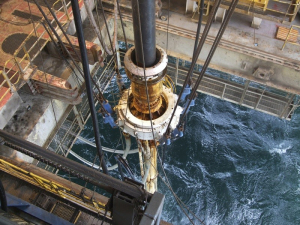UH Cullen College of Engineering part of the conference program
The Offshore Technology Conference (OTC), one of the largest energy expositions and the world’s foremost event for the development of offshore resources, is celebrating its golden anniversary this year. Its flagship conference – an annual event in Houston, the “Energy Capital of the World” – attracts attendees and exhibitors from around the globe. Since 1969, OTC has created an economic impact of $3 billion in Houston area.
More than 60,000 attendees representing more than 100 countries are expected to attend the 2019 conference.
Not surprisingly, the UH Cullen College of Engineering and UH Energy are part of the gathering. UH Energy has booth 1775 among the exhibitors and will have faculty and students share about their research and development work throughout the week-long conference.
Cullen College researchers are involved in several sessions as part of OTC’s technical program.
Phaneendra Kondapi, interim assistant dean for engineering programs at UH Katy campus and a professor with UH’s subsea engineering program, is chairing three sessions and also presenting a paper at the 2019 OTC.
The first one is a technical session titled “Cost effective production chemistry solutions for sustainable production,” that is running 2-4:40 p.m. on Tuesday, May 7 and features seven presentations. This session will present newly developed technologies and products for production chemicals, deployment and learnings, and the significance of reducing OPEX and unplanned shut down to achieve sustainable production. His co-chair is Muge Demiroglu from BP.
Kondapi is chairing two sessions on Wednesday, May 8:
One is the breakfast session titled “Life cycle water management: Addressing effective technologies and gaps” scheduled 7:30-9 a.m. The expert panel will discuss current challenges involved in the offshore water treatment and produced water treatment at the seabed. Current technologies to treat produced water are primarily at the topsides. Subsea separation systems currently do not meet the requirements to discharge the water back into reservoir. New technologies that address potential gaps and that are effective for subsea application will be discussed.
Speakers include Torbjoern Hegdal, business development manager of completions and production solutions for NOV and Donald Underwood, vice president of sales and marketing for Dril-Quip Inc.
From 9:30 a.m. to noon, Kondapi and Underwood will jointly chair a technical session, “Innovation and technology for cost effective subsea processing,” with seven presentations. In this session several successful projects will be presented that deliver on the long promised goal of increased production and reliability. Also, latest in subsea processing technology that promises further gains in cost and efficiency.
Individual presentations from the College Professors and Students include:
Tuesday, May 7
10:14 a.m. – Phaneendra Kondapi will present a paper titled “Effective strategies for flow assurance process design and execution” in the Flow Assurance and Engineering and Project Learning session. Kondapi will be talking about key flow assurance strategies adopted in various deepwater projects that were considered in the paper with an aim to summarize common strategies that arise and exceptions that could provide new strategies going forward.
Co-authors of this paper include: J.L. Creek from Rice University; Y. D. Chin from Yunka Energy, and R. Moe of TechnipFMC.
11:20 a.m. – Cumaraswamy Vipulanandan, a professor of civil and environmental engineering and the developer of an innovative material known as “smart cement,” is on the paper titled “Characterizing smart cement modified with Styrene Butadiene Polymer for quality control, curing and to control and detect fluid loss and gas leaks using Vipulanandan models.” Smart cement can detect pressure, cracks, corrosion and other damage in oil and gas operations, as well as notify engineers about whether the cement has set and report on its condition over time.
Co-authors include UH engineering students G. Panda, A. Maddi and G. Wong, along with A. Aldughather of Saudi Aramco.
Wednesday, May 8
3:28 p.m. – The “BOP pressure and flowrate conditions during high pressure gas kick control” paper will be presented by Matthew Franchek, professor of mechanical engineering and the founding director of the UH subsea engineering program, and his students A. Omrani and Y. Tang.
3:50 p.m. – Kaushik Rajashekara – distinguished professor of electrical and computer engineering, head of the Cullen College power and energy systems program and director of the Power Electronics, Microgrids and Subsea Electrical Systems (PEMSES) laboratory; Harish Krishnamoorthy, assistant professor of electrical and computer engineering along with UH engineering student A. Ray will present the session “Novel HVDC power transmission architectures for subsea grid.”
Thursday, May 9
11:14 a.m. – Cumaraswamy Vipulanandan will present another paper titled “New Rapid Nondestructive Testing Method for Detecting and Quantifying with Material Property Changes Using Vipulanandan Impedance Corrosion Model”. In this paper, carbon steel corrosion was evaluated in salt water solutions using the newly developed non-destructive electrical method which can be easily adopted in the field for real-time monitoring.
Co-authors include UH engineering students C. Ganapathy, K. Gebreselassic, D. Pan and G. Panda along with A. Ganpatye of Stress Engineering Services.
